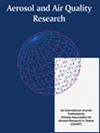禁行夜市周围不可忽视的近地PM2.5、UFP、PAHs和BC水平
IF 2.5
4区 环境科学与生态学
Q3 ENVIRONMENTAL SCIENCES
引用次数: 1
摘要
在一些人口特别密集的地区,大气细颗粒物(PM 2.5)本底浓度非常高,近地暴露成为危害人体健康的重大问题。本研究以济义市夜市为研究对象,采用联邦参考法(FRM)采集24小时PM 2.5样品,对PM 2.5的质量浓度、水溶性离子组分、碳似然、金属成分和来源贡献进行表征。为了更好地分析不同采样条件下交通源的贡献,利用移动实时监测系统对限行前后的NG-PM 2.5质量、超细颗粒物(UFP)数量、黑碳(BC)浓度和总多环芳烃(PAH)浓度进行了分析。结果表明,pm2.5浓度为7.26 ~ 58.6 mg m - 3。在化学分析中,次级成分如碳质和离子组分占PM 2.5的约60%,支持远程传输的重要性。但流量贡献约占30%,且不同样本间变化不大,不利于源分配。通过限行发现,限行前各类污染物均明显增加,即使限行后,pm2.5和BC浓度在低浓度季节也分别增加了131%和151%。在高浓度季节,交通限制显著降低了NG-UFP和NG-PAH浓度,分别降低了27%和55%,但NG-BC和NG-PM 2.5几乎未受影响。因此,除了交通源的贡献外,烹饪活动排放是夜市区域NG-PM 2.5水平上升的重要原因。本文章由计算机程序翻译,如有差异,请以英文原文为准。
The Unignorable Near-ground PM2.5, UFP, PAHs, and BC Levels around a Traffic Prohibited Night Market
In some special densely populated areas, the background atmospheric fine particulate matter (PM 2.5 ) concentration is very high, which makes near-ground (NG) exposure a major problem endangering human health. In our study, the night market in Chiayi City was selected as the research object and collected the 24-hour PM 2.5 samples through the federal reference method (FRM), characterizing the mass concentration, water-soluble ionic components, carbon specious, metal compositions and source contributions of PM 2.5 . To better analyze the contribution of traffic sources under different sampling conditions, the mobile real-time monitoring system was used to analyze the quality of NG-PM 2.5 , the number of ultra-fine particles (UFP), the concentration of black carbon (BC) and total polycyclic aromatic hydrocarbons (PAH) before and after the traffic restriction. Results indicated the concentration of PM 2.5 was 7.26 – 58.6 mg m – 3 . In chemical analysis, secondary contents e.g., carbonaceous and ionic components accounted for ~ 60% of the PM 2.5 , supporting the importance of long-range transport. However, the traffic contribution accounted for ~ 30% and hardly changed between different samples, which was not conducive to source apportionment. Through traffic restriction, it was found that all kinds of pollutants increased significantly before restriction, and even after restriction, the concentrations of PM 2.5 and BC increased 131% and 151% in low concentration season. In the high concentration season, the traffic restriction significantly reduced the NG-UFP and NG-PAH concentration by 27% and 55%, respectively, but NG-BC and NG-PM 2.5 was almost unaffected. Therefore, besides the contribution of traffic source, emissions from cooking activities are very important for the increase of NG-PM 2.5 levels in the night market area.
求助全文
通过发布文献求助,成功后即可免费获取论文全文。
去求助
来源期刊

Aerosol and Air Quality Research
ENVIRONMENTAL SCIENCES-
CiteScore
8.30
自引率
10.00%
发文量
163
审稿时长
3 months
期刊介绍:
The international journal of Aerosol and Air Quality Research (AAQR) covers all aspects of aerosol science and technology, atmospheric science and air quality related issues. It encompasses a multi-disciplinary field, including:
- Aerosol, air quality, atmospheric chemistry and global change;
- Air toxics (hazardous air pollutants (HAPs), persistent organic pollutants (POPs)) - Sources, control, transport and fate, human exposure;
- Nanoparticle and nanotechnology;
- Sources, combustion, thermal decomposition, emission, properties, behavior, formation, transport, deposition, measurement and analysis;
- Effects on the environments;
- Air quality and human health;
- Bioaerosols;
- Indoor air quality;
- Energy and air pollution;
- Pollution control technologies;
- Invention and improvement of sampling instruments and technologies;
- Optical/radiative properties and remote sensing;
- Carbon dioxide emission, capture, storage and utilization; novel methods for the reduction of carbon dioxide emission;
- Other topics related to aerosol and air quality.
 求助内容:
求助内容: 应助结果提醒方式:
应助结果提醒方式:


